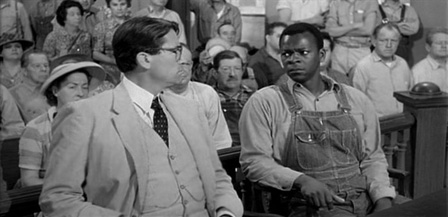|
|
A-List: Top Five Courtroom DramasBy J. Don BirnamMay 28, 2015
4. Philadelphia (1993) Speaking of somewhat unrealistic portrayals, my fourth pick is Philadelphia, a movie with cultural and movie-related repercussions that are hard to quantify despite the somewhat unrealistic pairing of its heroes. Tom Hanks won his first of back-to-back Oscars (becoming the last person to date to achieve this rare feat) for his portrayal of an AIDS-stricken lawyer who files an impossible lawsuit against the firm that fired him because of his condition. His Oscar speech is one of the most moving speeches I have ever heard (and it inspired another movie in which an actor wins an award and unwittingly outs his gay drama teacher - the 1997 Kevin Kline comedy In & Out). That’s one cultural repercussion. The other, of course, is Bruce Springsteen’s “The Streets of Philadelphia,” a touching song that also took home an Oscar and still reverberates today. The last is, obviously, that this was perhaps the first mainstream movie to talk openly about the HIV epidemic that had by then afflicted the country for 10 years, and, at the same time, to touch upon the realities of many gay Americans at the time. Taking tremendous and brave career risks, Antonio Banderas and Tom Hanks played lovers, while, in another risky move, Denzel Washington portrayed a somewhat homophobic lawyer tasked with prosecuting Hanks’ civil lawsuit. Yes, the movie falls into the inevitable courtroom drama trap of making a hero of the lawyer, but all is forgiven when the heart the story conveys is so touchingly translated into those scenes in which Washington’s character finally wakes up to the reality of his client. On its own, the movie is touching and memorable. As a landmark civil rights movie, however, it is also noteworthy and memorable.
|

|
|
|

|
Friday, November 1, 2024
© 2024 Box Office Prophets, a division of One Of Us, Inc.


